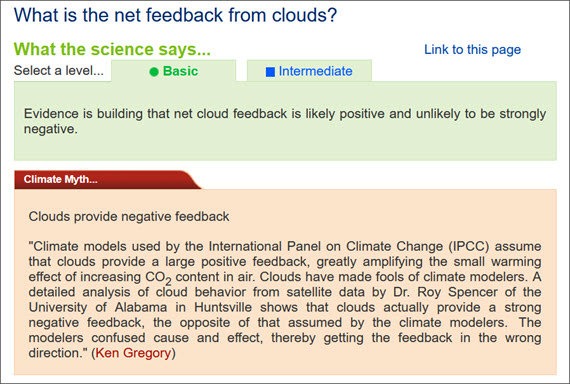At a glance - What is the net feedback of clouds?
Posted on 24 October 2023 by John Mason, BaerbelW
On February 14, 2023 we announced our Rebuttal Update Project. This included an ask for feedback about the added "At a glance" section in the updated basic rebuttal versions. This weekly blog post series highlights this new section of one of the updated basic rebuttal versions and serves as a "bump" for our ask. This week features "What is the net feedback of clouds?". More will follow in the upcoming weeks. Please follow the Further Reading link at the bottom to read the full rebuttal and to join the discussion in the comment thread there.
At a glance
What part do clouds play in your life? You might not think about that consciously, but without clouds, Earth's land masses would all be lifeless deserts. Fortunately, the laws of physics prevent such things from being the case. Clouds play that vital role of transporting water from the oceans to land. And there's plenty of them: NASA estimates that around two-thirds of the planet has cloud cover.
Clouds form when water vapour condenses and coalesces around tiny particles called aerosols. Aerosols come in many forms: common examples include dust, smoke and sulphuric acid. At low altitudes, clouds consist of minute water droplets, but high clouds form from ice crystals. Low and high clouds have different roles in regulating Earth's climate. How?
If you've ever been in the position to look down upon low cloud-tops, perhaps from a plane or a mountain-top, you'll have noticed they are a brilliant white. That whiteness is sunlight being reflected off them. In being reflected, that sunlight cannot reach Earth's surface - which is why the temperature falls when clouds roll in to replace blue skies. Under a continuous low cloud-deck, only around 30-60% of the sunlight is getting through. Low clouds literally provide a sunshade.
Not all clouds are such good sunshades. Wispy high clouds are poor reflectors of sunlight but they are very effective traps for heat coming up from below, so their net effect is to aid and abet global warming.
Cloud formation processes often take place on a localised scale. That means their detailed study involves much higher-resolution modelling than the larger-scale global climate models. Fourteen years on, since Ken Gregory of the dubiously-named Big Oil part-funded Canadian group, 'Friends of Science', opined on the matter (see myth box), big advances have been made in such modelling. Today, we far better understand the net effects of clouds in Earth's changing climate system. Confidence is now growing that changes to clouds are likely to amplify, rather than offset, human-caused global warming in the future.
Two important processes have been detected through observation and simulation of cloud behaviour in a warming world. Firstly, just like wildlife, low clouds are migrating polewards as the planet heats up. Why is that bad news? Because the subtropical and tropical regions receive the lion's share of sunshine on Earth. So less cloud in these areas means a lot more energy getting through to the surface. Secondly, we are detecting an increase in the height of the highest cloud-tops at all latitudes. That maintains their efficiency at trapping the heat coming up from below.
There's another effect we need to consider too. Our aerosol emissions have gone up massively since pre-Industrial times. This has caused cloud droplets to become both smaller and more numerous, making them even better reflectors of sunlight. Aerosols released by human activities have therefore had a cooling effect, acting as a counter-balance to a significant portion of the warming caused by greenhouse gas emissions.
But industrial aerosols are also pollutants that adversely affect human health. Having realised this, we are reducing such emissions. That in turn is lowering the reflectivity of low cloud-tops, reducing their cooling effect and therefore amplifying global warming due to rising levels of greenhouse gases.
Please use this form to provide feedback about this new "At a glance" section. Read a more technical version below or dig deeper via the tabs above!
Click for Further details
In case you'd like to explore more of our recently updated rebuttals, here are the links to all of them:
If you think that projects like these rebuttal updates are a good idea, please visit our support page to contribute!































 Arguments
Arguments































Comments